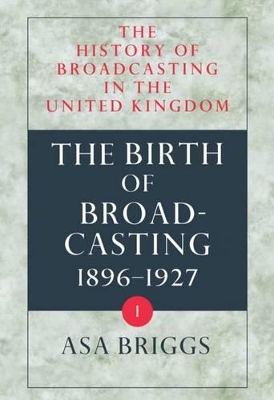The History of Broadcasting in the United Kingdom
3 total works
This is the third part of a five-volume history of broadcasting in the UK, giving an authoritative account of the rise of broadcasting in this country.
This volume covering the period from 1939 to 1945, is concerned not only with the impact of the Second World War on the structure, organization, and programmes of the BBC, itself a fascinating subject; it also deals directly with the role of the BBC outside as well as inside Britain within the context of the general political and military history of the war; an exciting, complicated, sometimes controversial role, strangely neglected by historians.
This volume covering the period from 1939 to 1945, is concerned not only with the impact of the Second World War on the structure, organization, and programmes of the BBC, itself a fascinating subject; it also deals directly with the role of the BBC outside as well as inside Britain within the context of the general political and military history of the war; an exciting, complicated, sometimes controversial role, strangely neglected by historians.
This is the first part of a five-volume history of broadcasting in the UK. Together the volumes give an authoritative account of the rise of broadcasting in this country. Though naturally largely concerned with the BBC it does give a general history of broadcasting, not simply an institutional history of the BBC.
The Birth of Broadcasting covers early amateur experiments in wireless telephony in America and in England, the pioneer days at Writtle in Essex and elsewhere, and the coming of organized broadcasting and its rapid growth during the first four years of the BBC's existence as a private Company before it became a public Corporation in January 1927. Briggs describes how and why the Company was formed, the scope of its activities and the reasons which led to its conversion from a
business enterprise into a national institution.
The issues raised between 1923 and 1927 remain pertinent today. The hard bargaining between the Post Office, private wireless interests, and the emergent British Broadcsting Company is discussed in illuminating details, together with the remarkable opposition with which the Company had to contend in its early days. Many sections of the opposition, including a powerful section of the press, seemed able to conceive of broadcasting only as competing with their own interests, never as complementing
or enlarging them. One of the main themes of this volume is that of the gradual forging of the instruments of public control, and particular attention is paid to the Crawford Report (1926) from which the Corporation arose. During this period all the characteristics of the Corporation first
appeared - particularly its reputation for publc service and impartiality.
Briggs also examines the background of wireless as an invention and considers its impact on society. He has much to say about personalities and programmes as well as policies.
The Birth of Broadcasting covers early amateur experiments in wireless telephony in America and in England, the pioneer days at Writtle in Essex and elsewhere, and the coming of organized broadcasting and its rapid growth during the first four years of the BBC's existence as a private Company before it became a public Corporation in January 1927. Briggs describes how and why the Company was formed, the scope of its activities and the reasons which led to its conversion from a
business enterprise into a national institution.
The issues raised between 1923 and 1927 remain pertinent today. The hard bargaining between the Post Office, private wireless interests, and the emergent British Broadcsting Company is discussed in illuminating details, together with the remarkable opposition with which the Company had to contend in its early days. Many sections of the opposition, including a powerful section of the press, seemed able to conceive of broadcasting only as competing with their own interests, never as complementing
or enlarging them. One of the main themes of this volume is that of the gradual forging of the instruments of public control, and particular attention is paid to the Crawford Report (1926) from which the Corporation arose. During this period all the characteristics of the Corporation first
appeared - particularly its reputation for publc service and impartiality.
Briggs also examines the background of wireless as an invention and considers its impact on society. He has much to say about personalities and programmes as well as policies.
`Competition' continues the monumental history of broadcasting in the UK over a period of 20 years, from 1955 to the mid 1970s. Unlike the previous volumes it chronicles and analyses the history of the BBC in an age of competition, so inevitably contains much fascinating material on the `independent' radio and television companies as well as the BBC.
The first chapter deals with the early relationship of the BBC to these new companies, sharing their impact on the types of programmes being broadcast.
The second chapter concerns Suez, the first time when there was a conflict between what the Government wanted broadcast and what the BBC felt it ought to broadcast.
Chapter 3 compares BBC programmes with their rivals' in the 1960s, and chapter 4 evaluates the effect of the new Director-General, Hugh Greene, the man who - Mary Whitehouse said - was `responsible for the moral collapse which characterized the sixties and seventies'.
The remaining chapters debate the changing relationship between politicians and broadcasters, Radio Piracy, the changes to the Third Programme, the introduction of new technologies, and the state of the BBC at the time of the Jubilee and the first meetings of the Annan Committee.
The first chapter deals with the early relationship of the BBC to these new companies, sharing their impact on the types of programmes being broadcast.
The second chapter concerns Suez, the first time when there was a conflict between what the Government wanted broadcast and what the BBC felt it ought to broadcast.
Chapter 3 compares BBC programmes with their rivals' in the 1960s, and chapter 4 evaluates the effect of the new Director-General, Hugh Greene, the man who - Mary Whitehouse said - was `responsible for the moral collapse which characterized the sixties and seventies'.
The remaining chapters debate the changing relationship between politicians and broadcasters, Radio Piracy, the changes to the Third Programme, the introduction of new technologies, and the state of the BBC at the time of the Jubilee and the first meetings of the Annan Committee.


